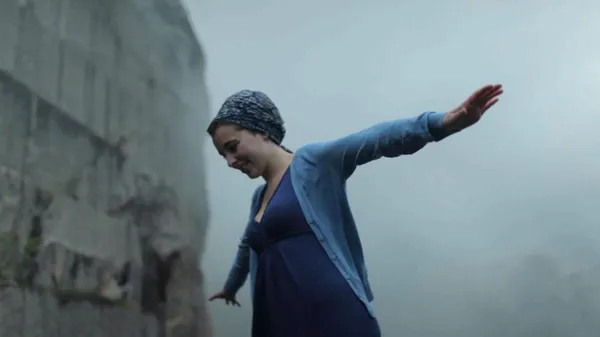Eye For Film >> Movies >> Bertsolari (2011) Film Review
Bertsolari
Reviewed by: Rebecca Naughten

Oral culture is usually based on maintaining a common identity, transmitting the past to future generations so that it is remembered, and is often coded in language that is specific to a given group. A 'bertsolari' is an improviser of sung rhymed verse in Euskara, the Basque language of northern Spain, a tradition that dates back centuries but continues to evolve as younger generations of practitioners join the performances.
Likened within the film to jazz, rap, and slam poetry, the mental capacity for word play and improvisation is truly impressive - in the public competitions, the bertsolari is given a topic onstage, along with the metre form (ie how many syllables and lines - and each line must rhyme), and then only has 15-20 seconds as they approach and pick up the microphone to form both an idea and where they want to go with it. This loses something in translation as the English subtitles don't rhyme, but if you concentrate on the sound as well as the words written on the screen, you can hear how the rhyme echoes throughout each 'bertso' (verse). Another layer to the performance is that the poetry is sung - the melody becomes another variable, and they perform without musical or percussion accompaniment. It is an austere art form, stripped back to the voice and wits of the singer.

It was originally a rural tradition but in the Sixties, under the Franco dictatorship, it moved into the cities and acquired elements of political and social critique as the people realised that the regime didn't speak Basque - they could publicly criticise the central authorities and assert an identity that was under threat. Today it is a communal/social event in everyday life, practiced in bars and social clubs with intergenerational participation - the official championship final held every four years attracts an attending audience of around 14,000 (a full stadium) and is a euphoric celebration of Basque identity. There's something both amusing and thrilling about seeing these astoundingly skilled but unassuming men and woman (women are slowly making inroads to being accepted as public performers) greeted like rock stars as they make their way to the stage.
As the bertsolaris describe the experience of performing 'bertsolaritza', director Asier Altuna visually represents their metaphors - whether that is the sense of standing on the edge of an abyss as they approach the microphone, or the idea of leaving the audience on the beach and letting your words break like waves on the shore. Mental thought processes are also visually rendered, for example as walls or beaches covered in words, as well as talked through in terms of how one might go about practicing for an improvisation. Nothing is memorised, and everything is only performed once - there are no second takes and each bertso only exists in the instance of its improvised performance by the bertsolari.
Altuna gradually builds up a picture of the practice and experience through different aspects of the whole - folklore/oral tradition, linguistics, the performative and the neurological. That might make it sound drily analytical but it is a beautiful film that manages to marry word, image, and music in a way that does justice to the poetry conjured up by the people it celebrates.
A fascinating documentary about the assertion of a communal identity in a form that will leave you marvelling at the verbal dexterity and ingenuity of its performers.
Reviewed on: 17 Mar 2014















